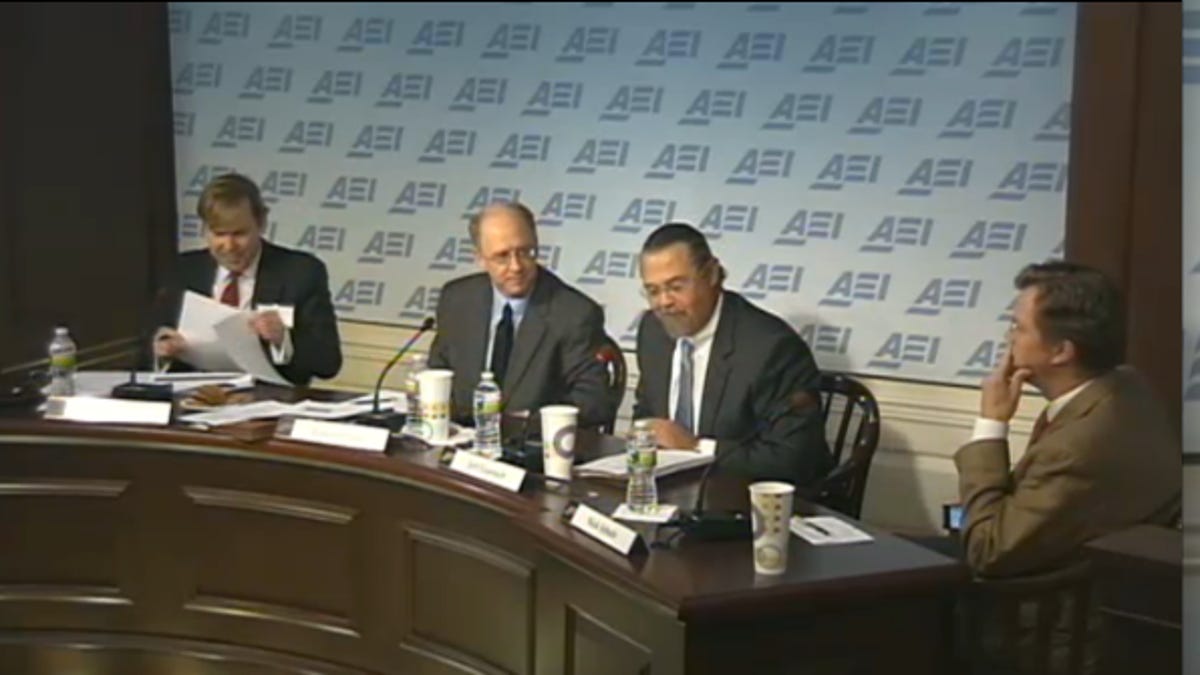Robert Bork on antitrust: Google is no Microsoft
The onetime Supreme Court nominee, who once attacked Microsoft over antitrust, says competitors are "seeking to use antitrust law" to punish Google. Meanwhile, the FTC is beginning to wrap up its probe.

Robert Bork, the fiery former federal judge whose U.S. Supreme Court nomination battle galvanized a generation of conservative activists, spent the late 1990s arguing that Microsoft should be carved up into multiple pieces because of antitrust violations.
Bork, an antitrust scholar and author of a landmark book on the topic, is now saying that Google is no Microsoft.
In a new analysis released at an event in Washington, D.C., today, Bork offers a point-by-point refutation of claims that Google has violated the law or acted in an anticompetitive fashion. Rather, Bork says, it's a case of competitors' sour grapes.
"None of the purported antitrust problems that Google's critics have raised indicates that Google is behaving anticompetitively," concludes the 29-page legal analysis (PDF). "Given the serious factual, logical, and economic flaws in the antitrust complaints about Google's practices, one can reasonably conclude only that Google's competitors are seeking to use antitrust law to protect their own market positions."
The paper's publication comes as the Federal Trade Commission is wrapping up its antitrust inquiry into Google, a probe that appears to have begun in mid-2011. The agency has hired a former Justice Department litigator to participate and has reportedly sent a subpoena to Apple asking for details about its mobile search deal.
Bork's mention of competitors is a not-so-veiled swipe at a lobbying group called FairSearch.org that's funded by Google competitors including Microsoft, Oracle, and Kayak. FairSearch claims that governments "must act now" against Google "to protect competition, transparency, and innovation in online search."
At an event organized by the American Enterprise Institute today, George Priest, a professor of law and economics at Yale University, also said he could find no evidence of antitrust wrongdoing. "Google's large market share is a result of the superior product that they've created," he said.
Bork's new paper, co-authored with economist Greg Sidak, took aim at three claims raised by rivals: whether Google acts as a "gateway" to the Internet, whether its specialized search results (such as interspersed links to images, video, and news) harm consumers, and whether it enjoys its current commanding position by making it difficult for competitors to reach the same "scale."
"I have no reason to believe that Google won't face lots of competitive rivalry in innovations in search technology," Sidak said. He said that Google had "commissioned" the study but the views expressed it it were solely his and Bork's. (Because of health reasons, Bork didn't attend today's AEI event.)
A FairSearch representative told CNET: "It's no surprise that a paper commissioned by Google, as footnoted on page one, would suggest that the company should not be subject to enforcement of existing antitrust laws. The bigger question is whether Google agrees with the paper's conclusion while claiming it is cooperating with investigations by law enforcement officials who have already identified the company's business practices as potential legal violations." (Google did not respond to questions this afternoon. We'll update the article if we receive a response.)
The paper warns that an FTC action against Google "for its search practices would necessitate regulation of search algorithms and product improvements, which would retard the current pace of innovation in Internet search that has created enormous gains in consumer welfare."
Bork's defense of Google is notable in large part because he helped to marshal the anti-Microsoft antitrust forces over a decade ago -- and because he wrote the 1978 book called The Antitrust Paradox, which influenced subsequent Supreme Court antitrust decisions by elevating harm to consumers over harm to competitors.
A 1998 CNET article reported that Bork had decided that Microsoft had gone too far, saying Redmond's "predation violates traditional antitrust principles" and concluding that Netscape and other competitors had been unlawfully targeted.
It was a departure from what many other conservatives and libertarians were saying at the time, prompting Bork to write a pointed essay for Slate in 1998, saying he was briefed by both sides and simply decided that the law favored Netscape.
"Judge Bork's defense of Netscape at the time of the Microsoft trial was surprising, but not necessarily a deviation from his long-held views, as he himself pointed out," says Geoffrey Manne, executive director of the International Center for Law and Economics and a fellow at TechFreedom.
Manne adds: "The main thing is, contrary to many assertions, this isn't Microsoft. The facts are simply too divergent to suggest that one's view of the cases must necessarily lead to the same assessment in each."
Disclosure: McCullagh is married to a Google employee not involved with this issue.
Update, 5 p.m. PT: Adds response from FairSearch.

